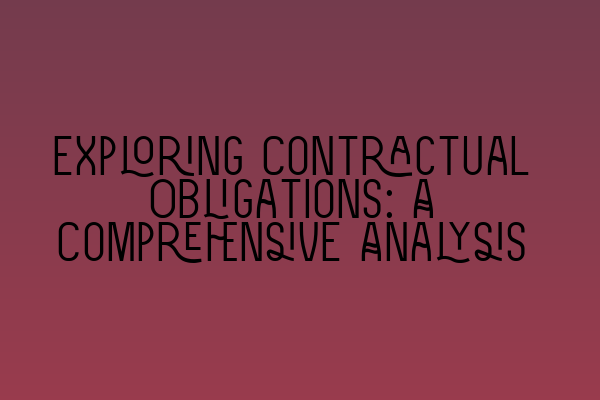Exploring Contractual Obligations: A Comprehensive Analysis
Contracts play a vital role in the world of law and business. They are the backbone of any legal transaction, ensuring that parties uphold their promises and obligations. As a solicitor, it is essential to have a comprehensive understanding of contractual obligations to provide the best advice and assistance to your clients. In this blog post, we will explore the intricacies of contractual obligations and delve into various aspects that every solicitor should be well-versed in.
The Basics of Contractual Obligations
Before delving into the complexities, let’s start with the basics. In simple terms, contractual obligations are the promises made by parties in a contract. These promises form the foundation of the agreement and define the rights and responsibilities of each party involved. It is crucial to have a clear understanding of these obligations to help clients navigate the legal landscape effectively.
When drafting a contract, it is essential to ensure that the obligations are clearly defined and properly documented. Ambiguity or vagueness in contractual terms can lead to disputes and legal complications down the line. By providing clear, concise, and understandable obligations, you can help your clients avoid unnecessary disputes and ensure a smooth contractual process.
Types of Contractual Obligations
Contractual obligations can be broadly categorized into two types: express obligations and implied obligations.
Express Obligations
Express obligations refer to the specific terms and promises explicitly stated in a contract. These obligations are usually documented in writing, leaving no room for interpretation or ambiguity. As a solicitor, it is crucial to review and analyze these express obligations carefully to ensure that they align with the interests and expectations of your client.
Express obligations can include payment terms, delivery schedules, quality standards, and any other specific promises made by the parties involved. By thoroughly understanding these obligations, you can help your clients draft contracts that protect their interests and meet their objectives.
Implied Obligations
Implied obligations, on the other hand, are obligations that are not expressly mentioned in the contract but are implied by law or the nature of the transaction. These obligations are often based on industry customs, standards, or legal precedents. It is crucial for solicitors to be aware of these implied obligations to ensure that their clients fulfill their legal requirements.
For example, if you are advising a client in a construction dispute, it is essential to understand the implied obligations of contractors to deliver work of a certain quality, adhere to safety regulations, and complete the project within a reasonable timeframe. By recognizing and addressing these implied obligations, you can protect your client’s interests and help them navigate potential disputes.
Breach of Contract and Remedies
Despite the best efforts in drafting and negotiating contracts, breaches can occur. Breach of contract refers to the failure of one party to fulfill their obligations as outlined in the agreement. As a solicitor, it is your role to assist clients in understanding their rights and pursuing remedies in case of a breach.
When a breach occurs, different remedies may be available to the aggrieved party. These remedies can include damages, specific performance, injunctions, or even termination of the contract. The appropriate remedy will depend on the nature of the breach and the objectives of your client.
It is crucial for solicitors to be well-versed in the remedies available for breach of contract and guide their clients in choosing the most suitable course of action. By providing expert advice and support, you can help your clients protect their interests and mitigate the impact of contractual breaches.
Importance of Clear Communication
Clear and effective communication is pivotal in ensuring that contractual obligations are fully understood by all parties involved. As a solicitor, it is your responsibility to help your clients navigate the complexities of legal jargon and ensure that obligations are clearly communicated and mutually agreed upon.
In addition to facilitating clear communication, solicitors can also assist clients in documenting any changes or amendments to contractual obligations. By implementing proper change management procedures, you can help clients avoid misunderstandings and disputes arising from modified obligations.
Conclusion
Understanding and navigating contractual obligations is a critical aspect of contract law. As a solicitor, your expertise in this area is invaluable in providing clients with the guidance and support they require. By staying up to date with current laws and precedents, communicating clearly, and offering expert advice on remedies, you can ensure that your clients are well-equipped to handle any contractual challenges that may arise.
For more information and resources on SQE preparation and contract law, you can explore the following related articles:
